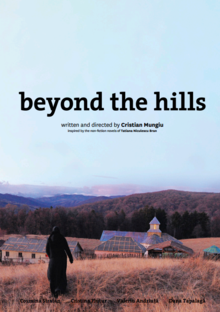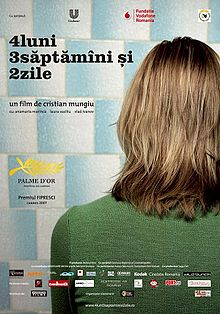 The 2000s brought in a time of extremely remarkable movies in Romania. Every year several of their movies won the highest prizes at international film festivals, and this movement is said to be the Romanian New Wave. Cristian Mungiu’s După dealuri (Beyond the Hills) made the shortlist at the end of this year to be nominated for the next Academy Award for Best Foreign Language Film. If nominated, it would be the first for Romania’s film industry. The Romanian New Wave is a general term for Romanian movies that have attracted international attention starting from the 2000s, but there are some commonalities between them, such as the addressing of social issues and the use techniques that are intentionally amateurish, minimalistic, and documentary-like. The generation that was in their teens and twenties when socialism collapsed is now in their thirties or forties and, with the influence of Western Europe and America, are making new movies.
The 2000s brought in a time of extremely remarkable movies in Romania. Every year several of their movies won the highest prizes at international film festivals, and this movement is said to be the Romanian New Wave. Cristian Mungiu’s După dealuri (Beyond the Hills) made the shortlist at the end of this year to be nominated for the next Academy Award for Best Foreign Language Film. If nominated, it would be the first for Romania’s film industry. The Romanian New Wave is a general term for Romanian movies that have attracted international attention starting from the 2000s, but there are some commonalities between them, such as the addressing of social issues and the use techniques that are intentionally amateurish, minimalistic, and documentary-like. The generation that was in their teens and twenties when socialism collapsed is now in their thirties or forties and, with the influence of Western Europe and America, are making new movies.
Romanian movies collapsed under the socialist government so there are no older, established directors that control the younger generation, meaning this younger generation of directors can act freely when making movies. Because they experienced the societal change and overturning of their world in the very sensitive time of their teens and witnessed the difficult rebuilding of their nation, they have many themes they wish to express. In addition, there is a curiosity from the whole world about what the people of Romania feel and think about now, and there is an audience carefully listening to the voices expressed through Romanian movies. Access to movies of Western Europe steadily became available, and the freedom to travel became guaranteed after Romania became a member of the EU. Moreover, there are role models of global fame close by, such as director Nuri Bilge Ceylan from their neighbor Turkey. All of these conditions that were conducive for filmmaking had ripened. Every time a Romanian movie wins an award at the Cannes and Berlin film festivals, the country rejoices for the honor received for the country, quite like the times when someone wins a gold medal in gymnastics for Romania in the Olympics.
 4 Months, 3 Weeks, and 2 Days is the most internationally successful movie of the Romanian New Wave. Set in Romania during the dictatorial regime of President Ceausescu, the movie depicts one day where the heroine helps with an illegal abortion for her roommate who is pregnant. Director Cristian Mungiu is in position for a nomination in the 2013 Academy Awards for Beyond the Hills. Because Cristian Mungiu was born in 1968 and is only 44, it may be said that he is the most successful director in Romania when considering his career.
4 Months, 3 Weeks, and 2 Days is the most internationally successful movie of the Romanian New Wave. Set in Romania during the dictatorial regime of President Ceausescu, the movie depicts one day where the heroine helps with an illegal abortion for her roommate who is pregnant. Director Cristian Mungiu is in position for a nomination in the 2013 Academy Awards for Beyond the Hills. Because Cristian Mungiu was born in 1968 and is only 44, it may be said that he is the most successful director in Romania when considering his career.
In Romania under a socialist government, abortion was illegal. Many young Romanian couples didn’t want children or at most had two or three; President Ceausescu, fearing a decrease in population, passed a law to prohibit abortions in 1968. As a result, there were women who risked getting illegal abortions and died. 4 Months, 3 Weeks, and 2 Days depicts the main character, a university student on the way towards elite status, rushing around to help her roommate get an abortion. The situation and the partner involved in the friend’s pregnancy are not depicted. This movie gives a glimpse into the life of intellectuals, right before the collapse of the socialist administration in Romania. For example, the protagonist searches for an illegal doctor that she heard about from word-of-mouth without consulting her friend’s parents; she walks the desolate streets of Bucharest where stray dogs are wandering around; she uses cigarettes in exchange for cash; when she enters the humble-looking apartment of her boyfriend’s family, we see the family is secretly enjoying a life of luxury (they appear to be quite rich); at the end, the main character’s boyfriend does not seriously consider what he would do if she were pregnant.
 If I Want to Whistle, I Whistle is the product of newcomer director Florin Serban and veteran screenplay writer Cătălin Mitulescu and was honored with two awards from the 2010 Berlin Film Festival—the Silver Bear Prize (Jury Grand Prix) and Alfred Bauer Award. Cătălin Mitulescu was born in 1972 and is just 40 years old. He made Trafic in 2004 which won the Short Film Palme d’Or award in Cannes, and this movie is said to be what led to the surge of the Romanian New Wave. His The Way I Spent the End of the World in 2006 gained great international attention. Director Florin Serban was born in 1975 and does most of his work in America.
If I Want to Whistle, I Whistle is the product of newcomer director Florin Serban and veteran screenplay writer Cătălin Mitulescu and was honored with two awards from the 2010 Berlin Film Festival—the Silver Bear Prize (Jury Grand Prix) and Alfred Bauer Award. Cătălin Mitulescu was born in 1972 and is just 40 years old. He made Trafic in 2004 which won the Short Film Palme d’Or award in Cannes, and this movie is said to be what led to the surge of the Romanian New Wave. His The Way I Spent the End of the World in 2006 gained great international attention. Director Florin Serban was born in 1975 and does most of his work in America.
If I Want to Whistle, I Whistle is about an 18 year old boy who is a juvenile delinquent living in a detention facility. How he ended up in this detention facility is not explained at all. However, people of Romania know that many children were taken to orphanages due to child neglect by the parents during the time of the Ceausescu administration. These children were called “Ceausescu’s bastards” and turned into street children, which later became a very serious social problem for Romania. Furthermore, after the collapse of the socialist administration, many parents found temporary work away from home in Italy or Spain in order to earn money. These children that were left had to find some means to survive, so many committed crimes and were sent to juvenile prison, like the main character of this movie.
If I Want to Whistle, I Whistle uses long shots with a handheld camera. Therefore, the picture shakes a little and somehow gives the impression that it is a documentary taken by an amateur. Florin Serban majored in film studies at an American university and watched many sophisticated movies, and I think he could make a sophisticated movie like these if he wanted to; however, I believe he intentionally chose to use a technique that uses raw material and an amateur-looking style in this movie.
There are not many people working as actors in Romania. Nationwide auditions are held for these movies and the actors chosen are amateurs and a few acting students. However, I think middle-aged Cătălin Mitulescu and Cristian Mungiu will start to train actors and movie developers and it is just a matter of time until a new maturity begins in the Romanian New Wave.
